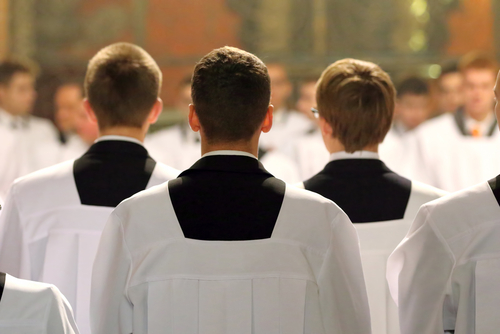Several of the world’s universities offer religious coursework even if a majority of the education offered is secular in nature; however, many students want to further expand their spiritual focus and how much attention they pay to it and decide to attend a seminary or theological school. There are hundreds of these types of places of higher learning in this country alone with a considerable number also being located elsewhere in the world.
Etymology
This word dates to the Middle Ages when it described an area of land where seeds were planted and later grew into plants. Today, it describes students’ spiritual growth as they go through the programs as well as the expansion of religious ideals and principles.
History of Seminary Schools
It’s possible to trace the history of seminary schools back to the Roman Catholic Church. The Council of Trent ran for nearly two decades and acted as the Catholic Church’s response to the Protestant Reformation. By the end of the Council, the Church decided to implement new schools that emphasized theology and similar studies to prepare priests for working with their congregations. In the United States, the Protestant Church began using the word seminary to describe the graduate schools that ministers attended. The first seminary in the country opened in 1807 and operated for more than a century before merging with a full university.
Types of Seminaries
When looking at what is a seminary, you may not know that there are different types. Minor seminaries are schools designed for teens and young adults who commit to the priesthood. Most function as boarding schools and ask students to live on-campus and focus on their training and education. Major seminaries are schools affiliated with college and university campuses. These schools offer theology and similar courses. Many offer undergraduate programs that help students finish their bachelor’s degrees. Major seminaries also include graduate and post-graduate programs. Students who already have their degrees and some experience teaching or working with parishioners can look for specialized schools that cater to advanced and adult learners.
Do Seminaries Have Official Affiliations?
While some seminaries have official affiliations with different organizations, not all do. Common examples include those affiliated with specific churches. The Catholic Church asks that priests attend seminary before taking their vows. Other churches such as the Protestant Church and Methodist Church often recommend that bishops and ministers obtain graduate degrees from these schools. A small number of seminaries are affiliated with specific denominations such as the United States Conference of Bishops, which has an affiliation with a seminary in Italy.
Can You Get a Bachelor’s Degree?
Seminaries often refer to graduate schools, but some of these schools offer undergraduate degree programs. These programs are open to new students who didn’t study theology in college and those who never attended college. Students need to complete a bachelor’s program before they can enroll in a graduate program. There are also some dual options that help students earn both their undergrad and graduate degrees in less time.
One degree option is a Bachelor of Ministry designed for future ministers. Students study different areas of the Bible and learn how to counsel others. Bachelor of Theology programs are also available that focus more on the Bible and what it can teach others. In a Bachelor of Religious Education program, students learn how to study the Bible more in-depth and teach its traditions to their flocks. These programs often take up to four years to complete and welcome students who have associate degrees. Those with an associate degree can graduate with a bachelor’s degree in three years or less.
What Graduate Degrees Do Seminaries Offer?
Seminaries offer many graduate degree programs designed for students who want to learn more about specific topics and areas of study. One of the more common degrees they can earn is a Master of Divinity. Most seminaries offer this degree, which is also one of the oldest degree types. These programs prepare students to lead and minister to others and focus on their religious heritage. There are nondenominational programs as well as programs affiliated with certain churches.
Many of the other degrees that students can choose are Master of Arts programs with a focus on religious studies. An emphasis on Applied Biblical Studies will let students learn how to interpret the Bible and use its teachings. Biblical studies programs are more common and look at the Bible as a whole. Students study the language of the Bible and how they can use its teachings in practical ways. There are also concentrations in Christian counseling and Christian education. Counseling programs prepare students for working with their parishioners and helping them use religion to help with their programs. Education programs include research and teaching for those who want to teach Christian subjects to others.
Can You Earn a Doctoral Degree?

You might look for an answer to what is a seminary to see if you can earn a doctoral degree. There are usually two types of doctoral degree programs. One is a Doctor of Philosophy that focuses more on writing and research. These programs expect students to complete a dissertation that they spend several years working on. Doctor of Philosophy programs are best for students who want to teach or work in academic settings. The other option is a Doctor of Ministry and designed for those who want to minister to others. These programs include more time working in the field and less time writing and doing research.
Do Seminaries Have Rules?
Before applying to a seminary, it’s helpful to look at the rules they have for students. These schools want their students to be responsible adults with a deep understanding of religious foundations. They often have rules that instill discipline in their students. Many require that students live on-campus and do not mix with members of the opposite sex outside of specific hours. They may require that you attend church services several times a week and even write short papers on the topics addressed during the services.
Some seminaries are stricter than others and have rules that relate to how students can act and dress. They ban students from using drugs or alcohol. Guys may need to have short hair and wear long pants and jackets to their classes. Women often need to wear dresses or skirts to their classes, though some schools now allow women to wear pants. You’ll also find that many seminaries do not allow students to live together if they are not married and have rules that ban students from engaging in LGBTQ+ activities.
Are Seminaries and Bible Colleges the Same?
Students interested in religious studies may consider both seminaries and bible colleges. Though some think the two schools are the same, they often teach different things. Bible colleges prepare students for ministry work and teaching others. They often offer certificate and diploma programs that can take two years or less to earn. Another thing to keep in mind is that these colleges usually do not have regional accreditation. They may have religious or national accreditation, which makes it hard for students to obtain financial aid. Students who want to earn degrees and get help paying for school while also studying more advanced subjects often pick seminaries.
How Long Does Seminary School Take?
The amount of time students spend in seminaries depends on the programs they choose and the education they have. If a student enrolls in a graduate program and does not have a solid background in religious studies, they may spend up to six or seven years to complete their studies. Those who already have a solid background can graduate in four to five years. Some programs include both four years of courses and a final year of practical experience. Students spend their fifth year working in the field before they graduate with their degrees.
What Can You Do With a Seminary Degree?
There are many things that you can do with a seminary degree, which is why many schools allow students to talk with graduates about their careers. You might use your degree to work as a chaplain and minister to others in need. Chaplains often work in hospitals and provide guidance to patients who are sick and their families. They can also work in the private sector the Bureau of Labor Statistics puts chaplains in the category of the clergy. According to the BLS, the median salary for chaplains is $27.19 per hour or $56,560 per year.
You may use your degree to work in a para-church, which is a church not affiliated with a specific denomination. They help people from all backgrounds and religions get help. You might travel across a region to talk with people about organizations and services that can assist them. There are also some careers that require a minimum of a graduate degree from a seminary such as counseling. You can use your counseling degree to become a licensed counselor in your state or to help parishioners within your church learn how their faith can help them recover from trauma.
Do All Seminaries Offer the Same Classes?
Most seminaries offer similar courses but not the same classes. You should expect to take multiple courses on different areas of the Bible such as the Old Testament and New Testament as well as theology classes that cover how God connects with others and what sin means in the modern world. Many schools offer training classes that prepare you for working with parishioners in different ways. These classes may include an internship in your church. Seminaries also offer fun classes that you can take as electives such as Religion and Film. Film courses let you watch movies that feature religion as a major plot point along with films about religious leaders. Students look at everything from the writing and directing to the acting and editing.
Do Seminaries Offer Financial Aid?
Seminaries offer financial aid in the same way that other graduate schools do but help students get money that they do not need to pay back. Incoming students must complete a financial aid application that shows the school how much money they make and how much help they need. Seminaries offer both merit-based aid and need-based aid. Merit-based aid includes scholarships for those who have more experience or earned high grades in their undergrad programs. Need-based aid goes to students who need more help paying for school and may include both grants and scholarships. Students can also use the scholarships and programs offered by their churches to cover both their living expenses and educational costs. Most seminaries award financial aid packages weeks or months before the semester starts.
What Can You Study?
A seminary is a school that is usually, but not always, part of a secular-focused institution that offers coursework and degrees in theological studies. These can include classes on the Bible in the case of Christian-focused seminaries, history of the religion being studied, examination of religious text and ethics. Practical courses are usually offered as well; these involve learning about become a spiritual leader and getting closer to that religion’s higher being or beings and helping others do so as well.
What Is Not Offered?
However, there are many things that seminaries do not offer. They cannot guarantee that those going through the program are upstanding people, and they do not provide hands-on experience with congregations, which should be done while completing the program and afterwards. Also, the student’s relationship with the religion’s higher body is a very personal one that can vary quite a bit from person to person although this coursework can definitely help strengthen it.
Why Should I Attend a Seminary?
What is learned while attending this type of education does provide tools not as easily found elsewhere, and significant benefits result from being immersed in this type of schooling. What you learn here will provide you with an impressive foundation of knowledge that you can pull from to help you react to any spiritual situations you encounter.
Accreditation
In the United States, the Department of Education recognizes these entities that accredit religiously focused institutions: Association of Advanced Rabbinical and Talmudic Schools, Association for Biblical Higher Education, Commission on Accrediting of the Association of Theological Schools and Transnational Association of Christian Colleges and Schools.
Attending Seminary
Those considering attending seminary should be constantly studying life, how people interact with each other and how spirituality plays into that. Engage in ministerial work if possible. When selecting a school, you should first look at the lists of accredited schools from one or more of the accrediting agencies listed above. However, do not simply rule out others if they fit your desires and where you believe you should be, but do note that if your chosen institution is not accredited, it may be difficult to continue your studies after your time there is completed. Either way, ensure that things like its faculty, library, student life, financial aid and theological commitments fit your desires and needs.
Just like with any other scholastic major or focus, realize that just because you have a spiritual focus in your coursework does not necessarily mean that you are locked into that type of life following your time there as several students head into a variety of professions afterwards. But a seminary is a great option for those who simply want to learn more about spirituality and to better incorporate it into their lives.
Related Resources:


